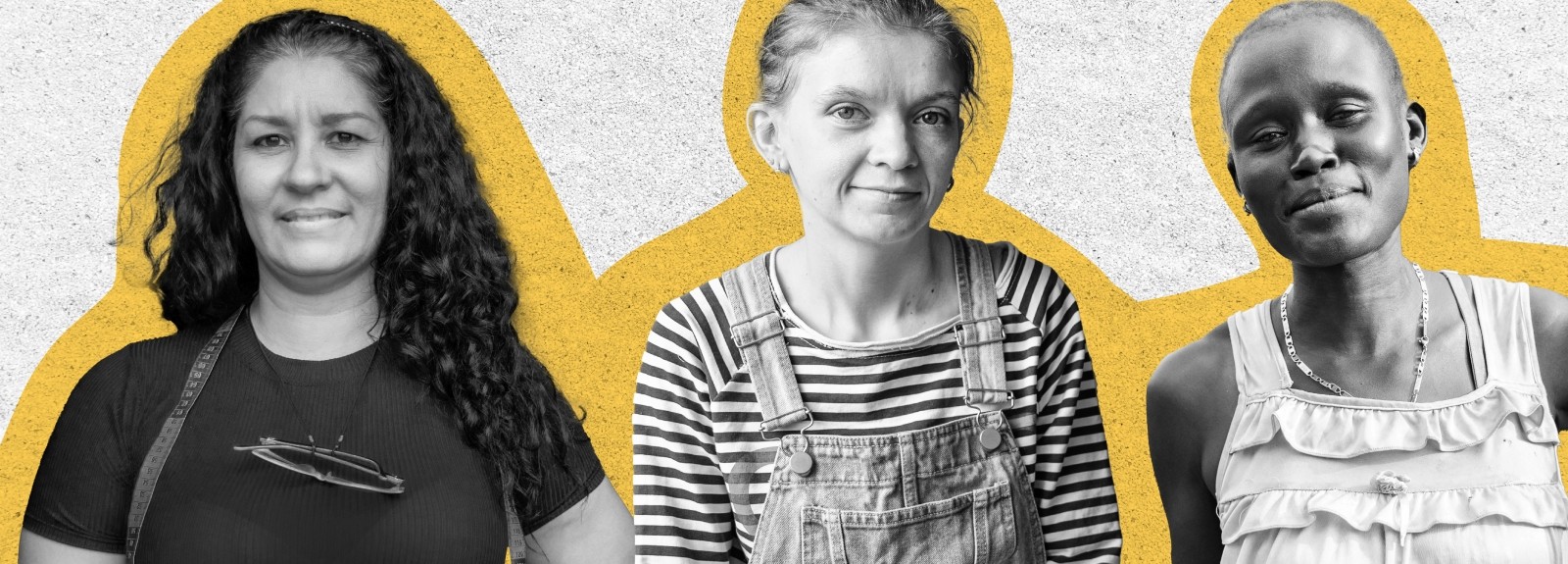For the first time ever, there are more than 110 million people in the world who are forcibly displaced — fleeing persecution, conflict, and violence, among other atrocities. Over 36.4 million of these people have had to flee not only their homes, but also their countries.
On World Refugee Day, we honor the strength, courage and resilience of those forcibly displaced. By fostering inclusion and solidarity in the communities where they have found refuge, we can foster long-term solutions for refugees and internally displaced people (IDPs), allowing them to thrive in a new environment or supporting them to safely return.
Meet three displaced individuals who have faced unimaginable challenges with remarkable determination.
Alina in Ukraine
One day after Russia invaded Ukraine, Alina Kravchenko’s husband signed up for the military. A week later, he was sent to the front lines.
After two months of constant shelling, she knew she had to leave. She packed everything she could fit in her car and left the rest behind, moving around for months. Finally, she settled in a one-room dormitory, a former art school converted into a women’s center supported by Corus International. With Corus’ humanitarian programming, Alina and her girls were able to access mental health services and art therapy while finding a support network of other military wives.
"We are all united now, I think, by the same disaster. We share our pain on this ground and empathize with each other."
A year later, Alina and her daughters have carved out a life in this new community.
“We are all living here with our neighbors as one big family, helping each other,” she says. She hopes to find a job so she can buy her own place, but it's been a challenge since day cares and schools are still closed and the girls are too young to be on their own.
More than anything, Alina hopes for peace.
Alina cuddles her daughters at the Corus International-supported women’s center for displaced Ukrainians.
Nyalual in South Sudan
Like many women in her community of Ayod, South Sudan, Nyalual Mathieng became a widow during the civil war, which claimed nearly 400,000 lives and displaced another 4.5 million.
In a culture where widows are often shunned, Nyalual worried about surviving as a single mother and sole provider, even as she mourned. Then flood waters came, and she had found herself fleeing with her children for safety in a canoe.
After a week in the canoe and days on foot, they reached Ayod. When her youngest child became very ill, a health clinic officer recognized malnutrition and referred her to a nutritionist. The nutritionist connected her the Livelihoods Options Support to IDP Households (LOSIH) project led by Corus organization Lutheran World Relief.
Since the project’s establishment in 2020, approximately 10,000 individuals, predominantly women, have received training in fishery, poultry, and farming or horticulture. They have also acquired essential skills in marketing, finance and investment, and learned how to operate a Village Savings and Loan Association (VSLA). Subsequently, they launched their businesses, directly benefiting over 52,000 people with their income.
Through the LOSIH project, Nyalual was able to access necessities like jerrycans and utensils as well as seeds for her garden. She no longer buys vegetables or sorghum at the market and even sells her surplus for income. She’s trained in the nutritional importance of a varied diet and practices farming at a demo plot. It’s connected her with other widows, who help each other with child care and support in uncertain times.
"I am planning for a better life for my children.'
Her children are now in school, and she hopes to expand her farm.
Nyalual holds her daughter Nyaun.
Hary in Peru
After being hit by a bus in 2013, Hary Silva faced an impossible decision. Forego proper health care and necessities due to skyrocketing inflation in her home country Venezuela or leave the only place she’d ever known. After five years, she finally decided she had to leave.
“I think that for all of the Venezuelans who emigrated, it's traumatic to leave all our lives behind,” she says. “That whole journey (to Peru) I just wanted to come back.”
Arriving in Peru with nothing but still determined to build a life, she was connected to Lutheran World Relief’s platform VenInformado, a digital platform that provides access to resources such as job trainings and free guidance. Topics range from legal requirements for refugees and residency status and managing mental health to resources for survivors of violence and guidance for starting a small business. Through the platform, she was connected with Lutheran World Relief’s local partner Encuentros, which gives refugee-entrepreneurs seed capital and training in digital marketing and skills to develop small businesses.
With this support for entrepreneurs, Hary was able to successfully launch a women’s clothing and accessories business called Saudihar Creaciones out of her home. She sells a variety of women’s garments including macrame clothing and sandals, bathing suits, hats, scarves, earrings, headbands and more.
Hear Hary’s story in her own words here:

